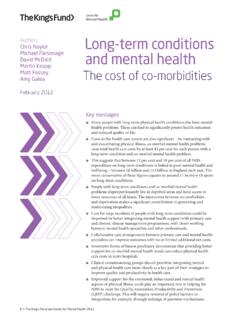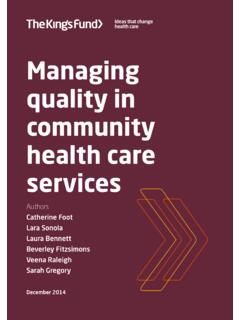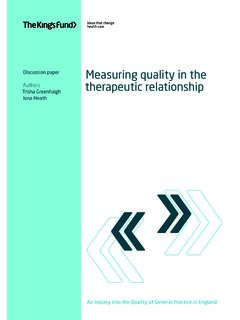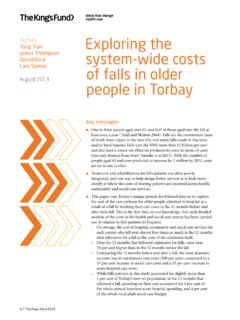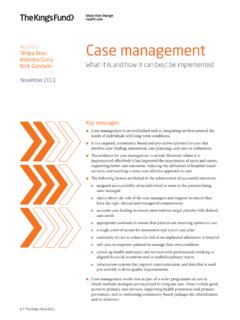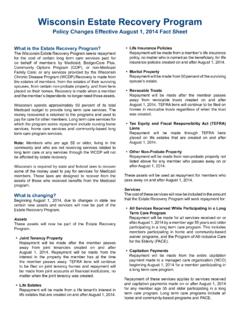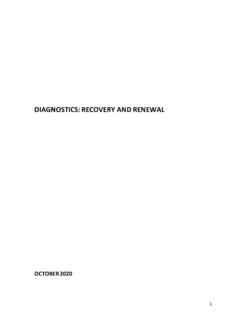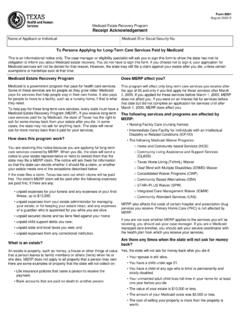Transcription of Managing people with long-term conditions - King's Fund
1 Managing people with long -term conditions Research paperAuthorsNick GoodwinNatasha CurryChris NaylorShilpa RossWendy DuldigAn Inquiry into the Quality of General Practice in EnglandManaging people with long -term conditionsNick GoodwinNatasha CurryChris NaylorShilpa RossWendy DuldigThis paper was commissioned by The King s Fund to inform the Inquiry panel. The views expressed are those of the authors and not of the panel. 3 The King s Fund 2010 ContentsExecutive summary 51 Introduction 9 Report structure 10 Methods 102 Policy review 12 Delivering higher-quality care for people with long -term conditions 133 Arthritis 16 Osteoarthritis 16 Rheumatoid arthritis 16 What does high-quality care look like? 17 What is the role of general practice?
2 20 The current quality of care in general practice 22 Measuring quality 23 The potential impact of quality improvements 244 Dementia 26 What does high-quality care look like? 27 What is the role of general practice? 30 The current quality of care in general practice 32 Measuring quality 35 The potential impact of quality improvements 365 Depression 38 What does high-quality care look like? 39 What is the role of general practice? 42 The current quality of care in general practice 43 Measuring quality 44 The potential impact of quality improvements 446 Diabetes 46 What does high-quality care look like? 47 What is the role of general practice? 50 The current quality of care in general practice 52 Measuring quality 54 The potential impact of quality improvements 547 Managing people with multiple long -term conditions 56 What does high-quality care look like?
3 56 What is the role of general practice? 58 The current quality of care in general practice 59 Measuring quality 608 Managing long -term conditions across a population 61 Evidence for population management in primary care 61 Population-based management in England: six case studies 644 The King s Fund 2010GP Inquiry Paper9 Conclusions 71 Measuring quality 71 The future role of general practice in meeting the challenge 75 References 78 Appendix 1 Literature review study terms and example of results 92 Appendix 2 Sample protocol for interviews with expert informants 93 Appendix 3 Numbers and types of expert informants 965 The King s Fund 2010GP Inquiry PaperExecutive summaryBetter management of people with long -term conditions has been a key priority of the NHS since the early 1990s.
4 At that time it was recognised that if people with long -term conditions were managed effectively in the community , they should remain relatively stable and enjoy a quality of life free from frequent crises or observed increases in hospital visits. However, relatively little information exists on what constitutes best practice in terms of the role that general practice should play in this care alongside other primary, community and social care report forms part of the inquiry into the quality of general practice in England commissioned by The King s Fund. Its core aims are to:establish what constitutes best practice in the management of long - term conditions (LTC management)describe the role that GPs and the wider general practice team should play in delivering high-quality care to those people with long -term chronic illnessesmake an assessment of current care quality establish whether measures of quality in LTC management could be developed to support quality improvements in general practice, and what these might research undertook a literature review of the evidence and best-practice guidance supplemented with face-to-face interviews with selected expert informants.
5 The research focused on six key areas:arthritis dementia depression diabetes people with multiple long -term conditions Managing long -term conditions across a population. ArthritisThe current state of care quality to people with both osteoarthritis and rheumatoid arthritis is difficult to determine given the lack of objective quality measures. However, the evidence suggests that care quality is currently highly variable and sub-optimal and could be significantly better understanding of the condition among primary care professionals is required, and a more proactive approach to care management is needed. General practice has a core role to play, but delivering high-quality care to people with arthritis should be shared across care settings and multi-professional The King s Fund 2010GP Inquiry PaperDementiaResearch suggests that early diagnosis and intervention is important in increasing the quality of life and life expectancy of people with dementia, and that general practice plays a pivotal role in this.
6 However, while the vast majority of first diagnoses for suspected dementia occur in general practice, this often occurs late in the illness or at a time of crisis, when the opportunities for the management of the condition to maximise quality of life have is evidence to suggest that many GPs are either unable or unwilling to recognise dementia symptoms, for a range of reasons, including:an inability to differentiate symptoms that may be attributed to the natural signs of ageing and/or could be confused with other disordersthe lack of specialist services to which patients may be referred the lack of training and/or time to make an adequate diagnosis the judgement that such individuals might cope better and feel less distressed if a formal diagnosis were was also evidence of a lack of ownership of dementia care responsibility within general practice, and a lack of necessary partnership working and/or care continuity.
7 However, examples do exist of high-quality care for example, where general practice has developed in-reach services into care homes, or has used multi-disciplinary care and assessment , there is no widespread use of approaches to measure the quality of dementia care in general practice, although audit criteria that support high-quality care have been people who experience depression over extended periods of time, high-quality care involves being supported by a planned system of collaborative care that involves case management, systematic follow-up and improved integration of primary and secondary care. High-quality care also requires sensitivity towards a patient s perception of the cause and nature of the problem. The evidence suggests the need for a strengths-based approach that provides treatment while also seeking to aid is a lack of clarity among GPs about what their role should be in the care for people with depression.
8 Our research suggests that GPs possess many of the right skills, but some lack the confidence, support or time to use them. Overall, there is considerable potential to improve the quality of care to people with mild-to-moderate depression in general practice, but there is a need for increased clinical education and training, alongside work to build collaborative care models with specialists and to tackle social attitudes and practice plays a pivotal role in the management of diabetes, and has made a significant contribution to its effective management. Many aspects of diabetes management have improved markedly in recent years, through 7 The King s Fund 2010GP Inquiry Paperbetter recording and ongoing management (incentivised through the Quality and Outcomes Framework).
9 However, the evidence suggests that there still remains a high degree of variability in performance. For example, only 51 per cent of people with type 2 diabetes, and 32 per cent of people with type 1 diabetes, currently receive all the care processes set out in best-practice guidance from the National Institute for Health and Clinical Excellence (NICE). Key areas for improvement include the initiation and implementation of care planning and the need to share information with patients and among care with multiple long -term conditionsThe impact of multi-morbidity is profound. people with several long -term conditions have markedly poorer quality of life, poorer clinical outcomes and longer hospital stays, and are the most costly group of patients that the NHS has to look after.
10 There is little evidence suggesting what high-quality care looks like for people with multiple long -term conditions (and hence few quality measures that could be applied). However, what evidence does exist suggests that people with multiple long -term conditions tend to get poorer treatment than challenges posed by multi-morbidity underline the importance of general practice, but also the need for it to work more collaboratively with other care providers and vice versa. Problems in the care of people with multiple needs appear to be system-wide rather than specific to general practice. This suggests a need for a collaborative care model comprising multi-disciplinary case management, systematic follow-up, and working that is better integrated for example between mental and physical health professionals.
